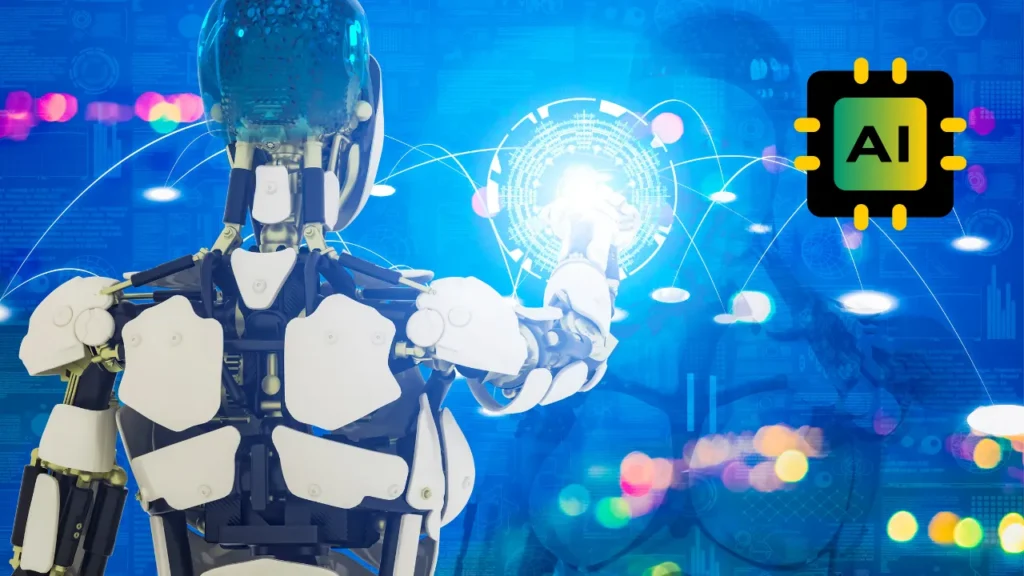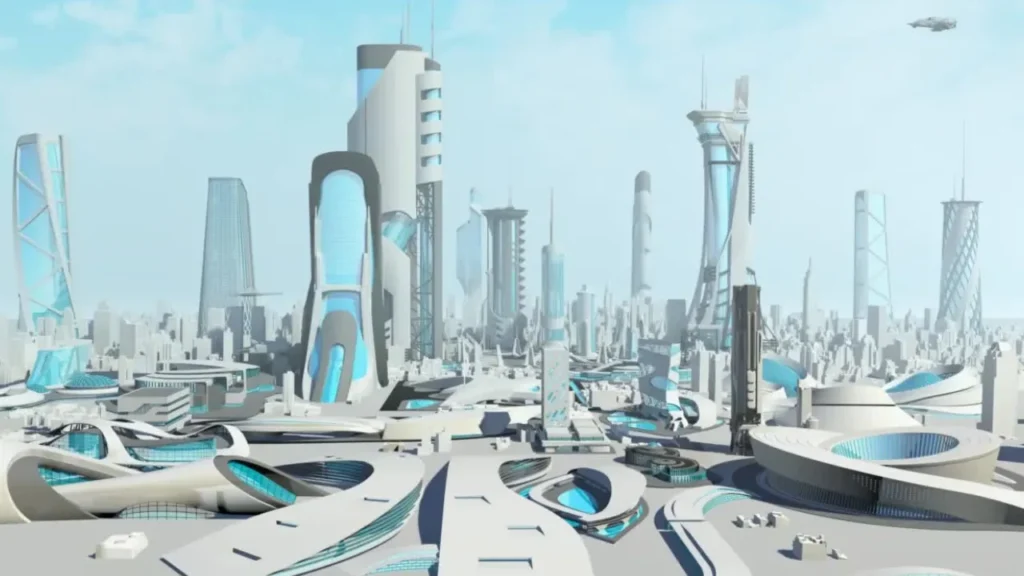Artificial intelligence advancements continue to influence humankind’s destiny in almost every sector. Emerging technologies such as big data, robotics, and the Internet of Things are already primarily driven by AI, and generative AI has increased the potential and appeal of AI even further.
Key Takeaways
AI’s transformative potential across industries:- Workplace Revolution: AI is set to automate and enhance job roles, with approximately 55% of companies implementing AI and potentially transforming workforce dynamics through upskilling and new job creation.
- Technological Innovation Acceleration: Advanced AI could compress decades of innovation into just 5-10 years, potentially revolutionizing research fields like biological sciences by dramatically reducing time between significant discoveries.
- Ethical and Societal Challenges: AI presents complex risks including potential job displacement, data privacy concerns, human bias perpetuation, and the emergence of sophisticated technologies that challenge existing legal and ethical frameworks.
- Sector-Wide Transformation: AI is rapidly reshaping multiple industries, from manufacturing and healthcare to transportation and education, offering unprecedented capabilities in data processing, automation, and personalized services.
A 2023 IBM poll found that 40% of enterprise-scale enterprises are thinking about implementing AI in their organizations, and 42% of them had already done so. Furthermore, 42 percent of firms are thinking about incorporating generative AI into their workflows, while 38 percent have already done so.
Here are some potential implications of AI advancements for different businesses and society as a whole, considering AI and the future of humanity.
To avoid AI detection, use Undetectable AI. It can do it in a single click.
Table of Contents
AI’s Development

Since 1951, when Christopher Strachey’s checkers program at the University of Manchester’s Ferranti Mark I computer finished an entire game, artificial intelligence (AI) has advanced significantly.
IBM’s Deep Blue defeated chess master Garry Kasparov in 1997 and its IBM Watson won Jeopardy! in 2011 due to advancements in machine learning and deep learning. Since then, generative AI has led the recent phase of AI development; in 2018, OpenAI released its first GPT models.
OpenAI’s GPT-4 model and ChatGPT are examples of this, and as such, there are now several AI generators that can analyze queries to generate pertinent text, audio, graphics, and other kinds of content. Artificial intelligence (AI) has also been used to assist with the sequencing of RNA for vaccinations and the modeling of human voice.
These technologies are built on machine learning models and algorithms and increasingly emphasize observation, reasoning, and generalization.
Future Effects of AI

Better Automation in Business
Approximately 55% of companies have implemented AI to some extent, indicating that many firms would soon become automated. Businesses can now rely on AI to manage straightforward customer engagements and respond to routine employee inquiries due to the growth of chatbots and digital assistants.
The decision-making process can also be sped up by AI’s capacity to evaluate vast volumes of data and translate its conclusions into easily understood visual formats. Instead of spending time analyzing the data individually, business executives may use real-time insights to make informed choices.
If developers have a thorough understanding of the domain and know what the technology can do, they begin to draw connections and think, maybe this is an AI problem, maybe that’s an AI problem, said Mike Mendelson, an NVIDIA learner experience designer.
That is frequently the case than saying, I want to fix a specific problem.
Workplace Disruption
Of course, concerns about job losses have arisen as an effect of business automation. Employees actually think AI could handle nearly one-third of their jobs. Even while AI has improved the workplace, its effects on various sectors and occupations have been uneven.
For instance, there is a chance that manual professions such as secretaries would be automated, but there is an increased demand for positions such as information security analysts and machine learning professionals.
It is likely that AI would enhance rather than replace workers in creative or specialized roles. AI is expected to encourage upskilling initiatives at the individual and corporate levels, whether it is by requiring workers to learn new skills or by replacing them in their current positions.
Investing heavily in education to retrain people for new jobs is one of the absolute prerequisites for AI to be successful in many areas, stated Klara Nahrstedt, a professor of computer science at the University of Illinois at Urbana-Champaign and the director of the school’s Coordinated Science Laboratory.
Concerns About Data Privacy
Large amounts of data are needed by businesses to train the models that drive generative AI technologies, and this procedure has drawn plenty of attention.
The FTC has opened an investigation into whether OpenAI has harmed consumers through its data collection practices after the company may have breached European data protection regulations, raising concerns about businesses gathering sensitive information about customers.
As a response, the Biden-Harris administration created an AI Bill of Rights, one of which is data privacy. Even if this legislation isn’t particularly effective legally, it does represent the growing movement to emphasize data privacy and force AI businesses to be open and careful about how they acquire data.
Improved Regulation
Depending on how generative AI cases play out in 2024, AI may change the way that some legal issues are seen. For instance, copyright litigation against OpenAI by authors, musicians, and businesses such as The New York Times have brought the topic of intellectual property to the fore.
Losing these cases might have serious repercussions for OpenAI and its rivals since they have an impact on how the American legal system defines private and public property. The U.S. government is under increased pressure to adopt a robust position due to ethical concerns that have emerged in relation to generative AI.
With its recent executive order, which establishes preliminary principles for data privacy, civil liberties, responsible AI, and other facets of AI, the Biden-Harris administration has maintained its moderate stance. However, depending on shifts in the political landscape, the government may decide to impose stringent rules.
Concerns About Climate Change
AI has the potential to significantly impact sustainability, climate change, and environmental challenges on a far grander scale. AI might be seen by optimists as a means of improving supply chains’ efficiency by doing predictive maintenance and other processes that lower carbon emissions.
On the other hand, AI might be considered a major contributor to climate change. Any attempts at sustainability in the tech industry could be severely hampered by the energy and resources needed to develop and maintain AI models, which could increase carbon emissions by up to 80%.
The expenses of creating and training models could put society in a worse environmental state than it was before, even if AI is used in climate-conscious technology.
Improved Rate of Innovation
Anthropic CEO Dario Amodei speculates in an essay about the potential of artificial intelligence (AI) that advanced AI technology could accelerate biological science research by up to ten times, establishing what he calls the compressed 21st century, where 50 to 100 years of innovation could occur in five to ten years.
With a lack of skilled researchers as the main obstacle, this argument expands on the notion that truly groundbreaking discoveries are produced perhaps once a year.
According to Amodei, we may reduce the time lag between significant discoveries, such as the 25-year lag between the discovery of CRISPR in the 1980s and its use in gene editing, by boosting the cognitive capacity allocated to formulating hypotheses and testing them out.
Which Sectors Would AI Primarily Affect?

Almost every significant industry has already been impacted by present AI. These are some of the sectors that AI is rapidly altering.
Manufacturing
AI has long benefited the manufacturing industry. Manufacturing bots and other robotic arms with AI capabilities date back to the 1960s and 1970s, demonstrating how effectively the sector has adapted to AI’s capabilities.
Predictive analysis sensors promise that machinery operates efficiently, and these industrial robots often collaborate with people to carry out a limited number of activities such as stacking and assembly.
Healthcare
Although it may seem improbable, AI healthcare is already altering how patients and healthcare professionals communicate. AI speeds up and streamlines medication research, improves the speed and accuracy of disease identification, and even monitors patients through virtual nursing assistants because of its big data processing skills.
Finance
AI is used by banks, insurance companies, and other financial organizations for a variety of purposes, such as fraud detection, auditing, and loan evaluation.
In order to swiftly assess risk and make astute investment decisions, traders have also taken advantage of machine learning’s capacity to evaluate millions of data points simultaneously.
Education
AI in education would transform learning for people of every age. Artificial intelligence (AI) uses machine learning, natural language processing, and facial recognition to digitize textbooks, identify plagiarism, and assess students’ moods to identify those who are bored or struggling.
AI adapts the learning process to each student’s unique demands both now and in the future.
Media
AI is also being used in journalism, and its benefits would only grow. The usage of Automated Insights by The Associated Press, which generates thousands of earning report pieces annually, serves as one such.
However, there are several concerns with the application of generative AI writing tools, such as ChatGPT, in journalism as they become available.
Customer Service
Although consumers hate receiving robocalls, artificial intelligence (AI) in customer service can provide the sector data-driven tools that offer valuable information to both the provider and the client. Chatbots and virtual assistants are two examples of AI systems that are transforming the customer service sector.
Transportation
One sector that is undoubtedly poised for significant AI development is transportation. AI would have an impact on numerous facets of how we move from point A to point B, including self-driving automobiles and AI trip planners. Autonomous vehicles would soon transport us from one location to another, despite their numerous shortcomings.
AI’s Risks and Dangers

Even while AI has had a positive impact on many businesses, there are still issues that should raise concerns. These are some possible dangers associated with artificial intelligence.
Job Losses
The abilities of 44% of workers would be disrupted between 2023 and 2028. Women have a higher likelihood than men to be exposed to AI at work, therefore not every worker would be impacted equally. Women appear to be far vulnerable to job loss when you combine this with the stark disparity in AI skills between men and women.
The widespread use of AI may lead to unemployment and fewer opportunities for those from underrepresented backgrounds to enter the tech industry if businesses don’t take action to upskill their employees.
Human Biases
AI’s reputation has been damaged by its propensity to mirror the prejudices of those who create the computational models. For instance, it has been shown that facial recognition software discriminates against persons of color with darker complexions and favors those with lighter skin.
AI tools have the potential to perpetuate social inequality and promote preconceived notions in users’ brains if researchers are not cautious to identify these biases early on.
Misinformation and Deepfakes
The proliferation of deepfakes poses a threat to the distinction between fact and fiction, making people wonder what is genuine and what isn’t. In addition, if people are unable to recognize deepfakes, the spread of false information could endanger both individuals and entire countries.
Deepfakes have been used, among other things, to put students in dangerous situations, perpetrate financial fraud, and spread political propaganda.
Data Privacy
The likelihood of data security breaches exposing the personal information of customers is increased when AI models are trained on publicly available data. In addition, companies add their own data to these dangers.
According to a Cisco survey from 2024, 48% of companies have input confidential company data into generative AI technologies, and 69% are concerned that these tools may harm their legal and intellectual property rights. Millions of customers’ personal information might be compromised in a single hack, leaving businesses at risk.
Automated Weapons
Countries and their citizens are seriously threatened by the employment of AI in automated weaponry. Automated weapons systems are already lethal, but they also don’t distinguish between civilians and soldiers.
Enabling artificial intelligence to end up in the wrong hands could result in careless application and the deployment of weapons that endanger larger populations.
Superior Intelligence
The so-called technological singularity, in which super intelligent robots take over and irrevocably change human existence through enslavement or eradication, is portrayed in nightmare scenarios.
Even if AI systems never develop to this degree, they may occasionally become so complicated that it becomes challenging to understand how AI makes judgments. This can end in a lack of openness regarding algorithm corrections for errors or unexpected actions.
Marc Gyongyosi, founder of Onetrack.AI, stated, I don’t think the methods we use in these areas now would lead to machines that decide to kill us. I believe that in five or ten years, I would need to reconsider that assertion because there would be various approaches and ways to approach these issues.
Read Also: AI is Not a Threat to Humanity
Conclusion: AI and the Future of Humanity
AI is expected to play an increasing part in people’s daily lives. The technology might be used to assist in the house and offer care for the elderly. In addition, staff could work together with AI in numerous contexts to improve workplace productivity and security.
The decision of those in charge of AI would determine how the technology is used. AI has the potential to be used maliciously for a number of purposes, including exposing people’s personal information, disseminating false information, and sustaining social injustices.
FAQs: AI and the Future of Humanity
Would AI replace human jobs?
AI would transform jobs rather than completely replace them, creating new roles and opportunities while automating repetitive tasks.
How safe is artificial intelligence?
Safety depends on responsible development, ethical frameworks, and continuous monitoring.
Can AI develop consciousness?
Current AI lacks true consciousness, though research continues to explore this fascinating possibility.
How can AI impact personal privacy?
AI raises privacy concerns, necessitating robust legal and technological safeguards.
Is AI accessible to everyone?
Democratization of AI technology is an ongoing process, with increasing accessibility worldwide.
What skills are required in an AI-driven world?
Creativity, emotional intelligence, critical thinking, and adaptability are key human skills that complement AI capabilities.


